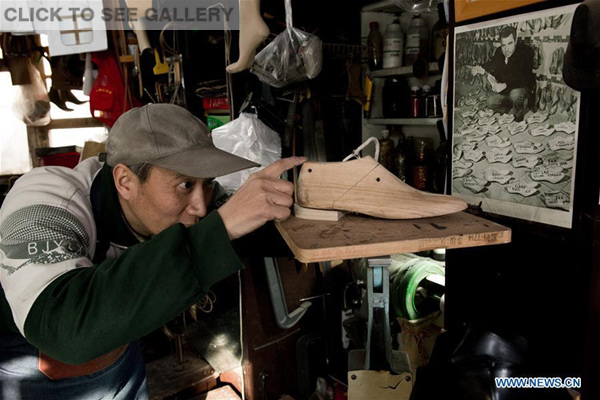Deep in the hutongs of central Beijing, Zhang Guoqing settles himself in front of a traditional hand-operated sewing machine, occasionally glancing at an iPad displaying a pair of polished brown shoes.
Surrounding him, wooden shoe trees, metal tools and scraps of leather fill the cobbler's workshop. The 53-year-old shoemaker will remain seated in front of the second-hand sewing machine all day, except when sleeping and dining. "I have always dreamed of making shoes," he said.
Tailor-made shoes usually require several manufacturing steps and specialized staff to complete, but Zhang has been crafting and designing custom shoes by himself since he first opened the workshop in 1997.
"All customers have their own customized shoe trees," Zhang said, referring to the wooden frames around which the material is molded to create a shoe. "This is bespoke crafting."
He only averages two pairs of shoes each month. "I charge around 200 yuan in labor per day. Combined with the cost of material, a pair of shoes at my workshop is around 4,000 yuan."
The price is much higher than those usually sold at stores. "But they cannot service customers who have odd-shaped feet or special design requirements."
Zhang comes from a family of shoemakers who first learned their craft after the founding of the People's Republic of China. His parents were dispatched to a leather factory in the capital from Shanghai, the eastern coastal metropolis of China.
"In the early 1950s, the country called on people 'to support the construction of Beijing'," Zhang said.
During those times of poverty, buying a pair of leather shoes was considered a luxury, the creation of such items an honorable profession.
"My father's monthly salary was more than 80 yuan, which was higher than average in Beijing," Zhang said.
As a youth he studied traditional Chinese paintings, never thinking he would follow in his parents' footsteps. But after failing the national college exams in 1982, he felt lost, working menial jobs and scraping by.
Insisting he have a skill that will feed him for a lifetime, Zhang's parents enrolled him as an apprentice under a master shoemaker.
"'Can you handle this, boy? If you cannot, get away from me.' Those Are the first words he said to me." Zhang recalled.
Zhang learned quickly and found a job at the Beijing Leatherware Factory in 1985.



















































